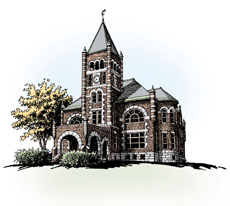

|

Search UNH Magazine: |

Lasting Impressions By President Joan R. Leitzel
Each of us remembers our alma mater in terms of its faculty. The faculty is the university. Faculty members do much more on behalf of students than simply meet their scheduled classes. They provide one-on-one research supervision and collaborate in the teaching of interdisciplinary courses. They structure and direct group projects. They adapt their instruction to use the latest tools of technology. They advise students, not only about career options, but about the range of issues that challenge undergraduates. UNH is very fortunate to have an unusually committed and qualified faculty. The university chooses its faculty carefully in the hiring process. A UNH faculty member must combine his or her scholarly interests with a commitment to undergraduate instruction. Not every respected scholar belongs at UNH. Our faculty are special people. research and high-quality teaching are mutually supportive. This past year I was the university's mentor for five freshman students. The responsibilities of a mentor are different from those of a student's academic advisor. University mentors volunteer to touch base with a small number of freshmen periodically to make sure that they are successfully addressing all of the challenges of the first year. I noticed when I talked to one of my advisees that the conversation always came around to his freshman composition course. He was enrolled in an honors writing course taught by a faculty member in the English department. This student found his writing course so exciting that he shared the content of the class with me each time we were together. I asked him once if he would like to major in freshman comp. He admitted that if the same faculty member could teach him for four years, he would consider doing that. The University of New Hampshire encourages and supports exceptional teaching in a number of ways. For example:
In the last few years, there has been considerable concern nationally about the quality of undergraduate education at our nation's research universities. In 1997, the Carnegie Foundation released a study that called for "a new model of undergraduate education at research universities that makes the baccalaureate experience an inseparable part of an integrated whole." In fact, UNH offers such a model. UNH is a major research university, but with a primary commitment to undergraduate education. Teaching and research activities are well integrated, and undergraduates participate in the research work of faculty and graduate students. UNH's success in using research as a way to strengthen undergraduate education has attracted substantial attention. We are one of the universities identified to lead a national program to prepare doctoral students for their teaching roles. An Undergraduate Research Conference at UNH last spring directly showcased the accomplishments of our undergraduates and exhibited the deep learning that takes place through research. UNH demonstrates that high-quality research and high-quality teaching are mutually supportive. We are proud of that. ~ We'd like your opinion! Visit President Leitzel's home page. Archives of President Leitzel's columns. blog comments powered by Disqus 9 Edgewood Road Durham NH 03824 (603) 862-2040 alumni@unh.edu |